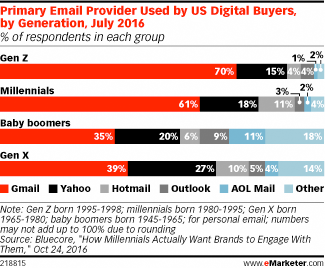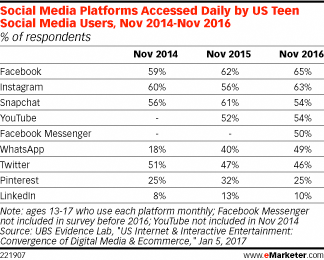Does Facebook Have an Identity Crisis?
February 15, 2017
![]() As Facebook develops an ever-more diverse portfolio of businesses, questions arise of whether it risks diluting its core identity.
As Facebook develops an ever-more diverse portfolio of businesses, questions arise of whether it risks diluting its core identity.
Put another way, will the future of Facebook look like Google? Or, will it look more like Yahoo?
Like both Yahoo and Google, Facebook has developed—and has invested in—a multitude of businesses that sometimes are only tangentially related to its core platform. At this point, Facebook has tested or continues to test ventures in ecommerce, payments, gaming, mobile messaging, virtual reality, set-top boxes and more.

Sound familiar?
It sounds a bit like Google, right? Google’s complex web of investments and new products ultimately led to the creation of a new holding company, Alphabet, whose dominant search business generates the vast majority of revenue, while other units remain intriguing, but largely revenue-neutral.
On the flip side, it sounds a lot like Yahoo, too. Yahoo has been involved in virtually every digital aspect since it defined the concept of a portal. The products that Yahoo has acquired or created run to the hundreds—and its list of scuttled enterprises runs long, too.
If identity is merely revenue momentum, then Facebook looks more like Google. Its Q4 2016 revenues soared more than 50%, while Alphabet’s surged 22%. At the same time, Yahoo’s revenues edged downward, after taking traffic acquisition costs into account.
But if identity is more content-driven, then Facebook bears a distinct resemblance to Yahoo. Both companies found financial success based on building a massive audience—and then delivering display advertising to that audience.
 The difference may come down to utility vs. content. Tastes change, and content providers often have trouble keeping up. Utilities, on the other hand, are much less subject to the whims of taste. Consider email patterns, for example. Younger people are far more likely to use Gmail compared with baby boomers, who continue to use “older” platforms, according to Bluecore research.
The difference may come down to utility vs. content. Tastes change, and content providers often have trouble keeping up. Utilities, on the other hand, are much less subject to the whims of taste. Consider email patterns, for example. Younger people are far more likely to use Gmail compared with baby boomers, who continue to use “older” platforms, according to Bluecore research.
In that regard, Facebook is more like Google: Although it is a platform for viewing content, at a more fundamental level Facebook is a utility for maintaining relationships. And that makes it more difficult to discard.
Consider Facebook usage among younger age groups. For years, experts have argued that teens would soon abandon Facebook. And for years, that has not been the case—teens continue to be very much active on Facebook. According to September 2016 data from Barkley and FutureCast, 77% of internet users ages 15 to 19 said they use Facebook.
And they use it on a regular basis. UBS Evidence Lab found that daily user penetration among teen social media users reached 65% in 2016—a higher rate than seen in the past two years.
“While teens may no longer love Facebook and certainly don’t see it as cool, it’s simply too useful for them not to use,” said eMarketer analyst Mark Dolliver.
Meanwhile, audience size by itself is not an advantage for a pure content platform, but it confers a huge advantage for a utility. For example, a significant number of readers on a news site doesn’t necessarily create value for an individual user. But a significant number of searchers creates more accurate search results for an individual user.
“Because of Facebook’s core function as a platform for connecting with almost anyone, its size really is a genuine advantage for each user,” said Dolliver. “In other words, in Facebook’s case, the fact of being so big is in itself a factor that will help it remain big.”
That long-term advantage should give Facebook plenty of room to experiment with different identities.
Courtesy of eMarketer































